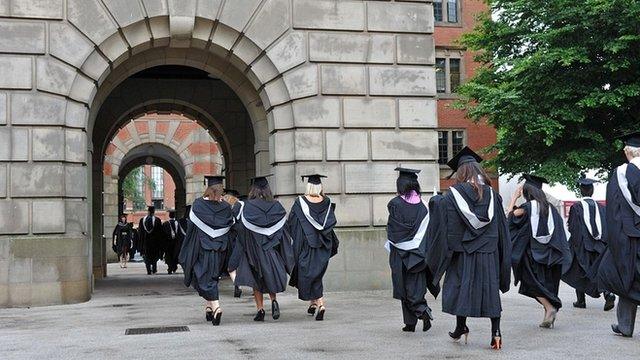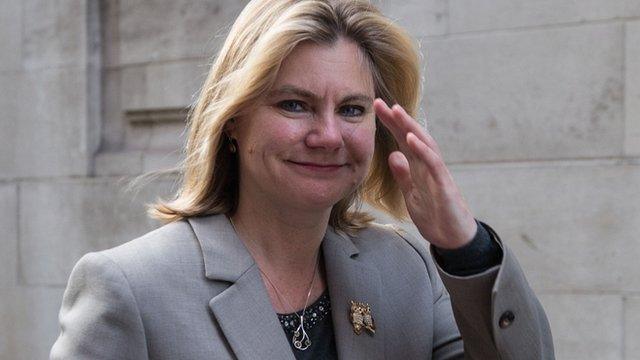Labour warns of rising tuition fees
- Published

MPs debated plans which would allow a wider range of institutions to become universities
University tuition fees in England would face "significant rises" under plans being put forward by the government, says Labour's shadow education minister Gordon Marsden.
The government wants to allow fees to rise with inflation if universities have a high standard of teaching.
Mr Marsden said it gave universities "cash-in coupons" to raise their fees.
Education Secretary Justine Greening defended the need to protect the value of fees for "high quality providers".
Ms Greening, heading a department now responsible for higher education as well as schools, presented plans which will encourage more competition within higher education.

Justine Greening said expanding universities would boost the economy
The education secretary told the House of Commons the changes would not reduce parliamentary scrutiny of the maximum level of fees in England, which is currently £9,000 per year.
"But what we are saying to high quality providers is you can access fees up to an inflation-linked maximum fee cap if, and only if, you can demonstrate that you are providing high quality teaching and you have an agreed access and participation plan in place."
But Mr Marsden said that in unpredictable economic times after the EU referendum, with no certainty on future levels of inflation, this could mean "significant rises in fee costs".
Raising fees in line with inflation will depend on universities providing high quality teaching, which would be measured by a "teaching excellence framework".
Mr Marsden said this would become a "Trojan horse" for raising fees.
"This is particularly problematic for students post-Brexit with the fragility of our current economy and there are no guarantees on the level of inflation for the next few years."

Labour's Gordon Marsden warned there were no guarantees on how high fees might rise
Mr Marsden said "all bets were off" on how much fees might rise in the years ahead.
Ms Greening was also pressed by MPs on a lack of information for universities about what will happen to their EU staff and students and EU research funding.
The government's plans, in the Higher Education and Research Bill, will encourage more universities to be created and to make it simpler for institutions to gain their own degree awarding powers.
Ms Greening said research showed that increasing the number of universities would improve the economy.
"But the current system for creating universities can feel highly restricted, with new providers requiring the backing of an incumbent institution to become eligible to award its own degrees.
"This Bill levels that playing field by laying the foundations for a new system where it will be clearer, simpler and quicker to establish high quality new providers."
Office for Students
Ms Greening also set out plans for an Office for Students, which would help to protect value for money for students.
This followed concerns from students on issues such as a lack of teaching hours.
Neil Carmichael, chairman of the education select committee, said the result of the EU referendum made higher education even more important for the economy.
"Brexit is a call to arms for our education system because we have got to provide more skills, the skills that we need, because we won't necessarily be able to allow anyone from the European Union to do that for us," said Mr Carmichael
Labour's Stella Creasy said that pushing up fees would limit social mobility.
"The biggest division in our society today is who is able to turn to the bank of mum and dad and who is not," she said.
The Scottish National Party's education spokeswoman, Carol Monaghan, warned against changes putting "profit before students".
"The drive towards the marketisation of student experience is one which we should all view with caution," she told MPs.
The Liberal Democrats said the bill was no longer "fit for purpose" in the "instability" following the EU referendum decision.
"The bill totally fails to address the challenges universities will now face around securing funding for research or ensuring student numbers remain level.
"It cannot be allowed to go ahead in its current form," said Lib Dem education spokesman John Pugh.
- Published18 July 2016